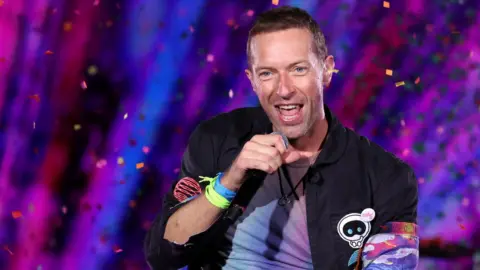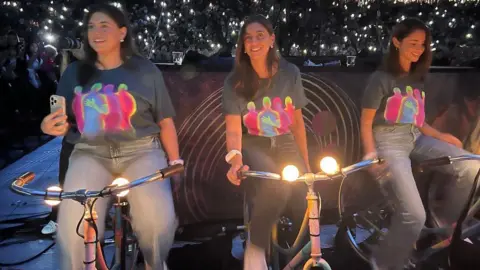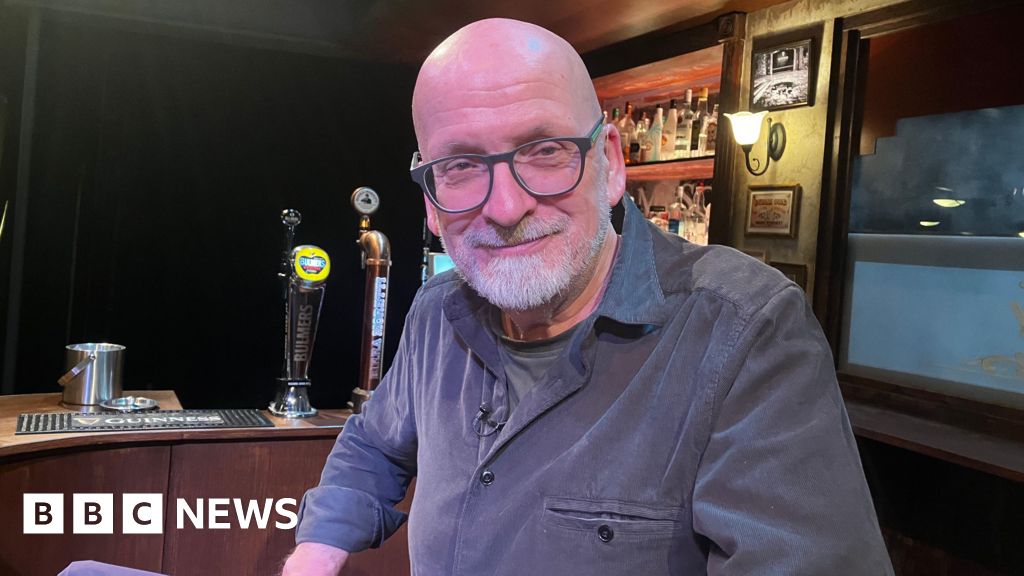ARTICLE AD BOX
19 minutes ago
Mark Savage,Music correspondent

 Reuters
Reuters
Coldplay have taken a lead in developing sustainable touring technology
In 2021, Coldplay announced a 12-point plan to cut the carbon footprint of touring by 50%.
Now, they've given an update on their progress, saying the first two years of their Music of the Spheres tour saw a 59% reduction in carbon dioxide emissions compared with their previous world tour.
They have used things like a dancefloor that generates electricity when fans jump up and down, and have cut down on air travel.
They have also revealed that seven million saplings have been planted as part of a commitment to grow a tree for every fan attending the shows.
"As a band, and as an industry, we’re a long way from where we need to be on this," they said in a statement.
"But we’re grateful for everyone’s help so far, and we salute everyone who’s making efforts to push things in the right direction."
Coldplay: Band announce first tour in four years with an 'eco-friendly' focus
Coldplay first pledged to cut their carbon footprint in 2019, telling the BBC they would not tour again until they could do so in a more sustainable way.
Two years later, they announced a plan to tackle those issues, including:
- Solar panels, kinetic flooring and exercise bikes that help to power the venues
- Minimising air travel, with sustainable aviation fuel used where flying is unavoidable
- Energy-efficient lighting
- Building sets with sustainable materials like bamboo, where possible
At the time, frontman Chris Martin said he was prepared for a "backlash" over areas like air travel, where the band were still having a negative environmental impact.
"The people that give us backlash for that kind of thing, for flying, they're right," he said. "So we don't have any argument against that."
However, he did pledge to take public transport to gigs when possible - and arrived for their shows in Cardiff last year by train.
An interim report, released last July, suggested the band had fallen short of their goals, achieving a 47% reduction in carbon emissions.
New figures suggest the tour has become more efficient as it progresses.
Among the developments, 72% of tour waste was diverted from landfill and sent for reuse, recycling and composting - up from 66% in 2023.
And the band said the energy produced by in-venue solar installations, kinetic dancefloors and power bikes has increased from 15 to 17 KwH per show - enough to power one of the smaller stage areas each night, and provide the crew with phone, laptop and tool-charging stations.
They said the figures had been assessed and verified by the environmental solutions initiative at the Massachusetts Institute of Technology (MIT).
Coldplay have also funded two solar-powered "ocean cleanup river interceptors", which extract plastics from the ocean.

 Coldplay
Coldplay
Fans use electricity-generating bicycles at a Coldplay concert in Amsterdam
MIT's Professor John E Fernandez praised the band for "setting a new standard for the entire music industry".
"With each subsequent year of their tour, they demonstrate an evolving vision and expanded commitment to move the entire music industry toward true and humane sustainability and planetary resilience."
Speaking to BBC Radio 4's Today programme in December, Martin said he wanted to prove that sustainable touring was achievable.
"What we’re trying to do is actually not advocate at all but just prove that it makes business sense - because that’s where we feel you’ll really get people to change, saying, ‘Hey you can make more money'.
"At the end of the day, for a lot of people, that’s their primary consideration in every wealth bracket, so we’re really trying to show on this tour that being clean and green isn’t some charitable left-wing wishy-washy thing.
"It’s like, no, this is the best business sense too."


Billie Eilish established the climate action campaign Overheated
The band are not alone in tackling the environmental impact of making and playing music.
In February, The 1975 played four "carbon removed" gigs at London's O2 Arena.
The band and venue calculated that the shows generated 546 tonnes of carbon dioxide, mainly by fans travelling to the shows - so they removed an equivalent amount from the atmosphere using methods including tree-planting and direct air capture.
More than a decade ago, Radiohead pioneered the use of low-energy LED lighting rigs, rather than more power-hungry spotlights.
And Billie Eilish recently released her new album, Hit Me Hard And Soft, on recycled and eco-vinyl, with all the packaging made from recycled materials.
The star has also established a global conference called Overheated, which looks at solutions to the climate emergency, focusing on the contributions young people can make.

 11 months ago
34
11 months ago
34








 English (US) ·
English (US) ·